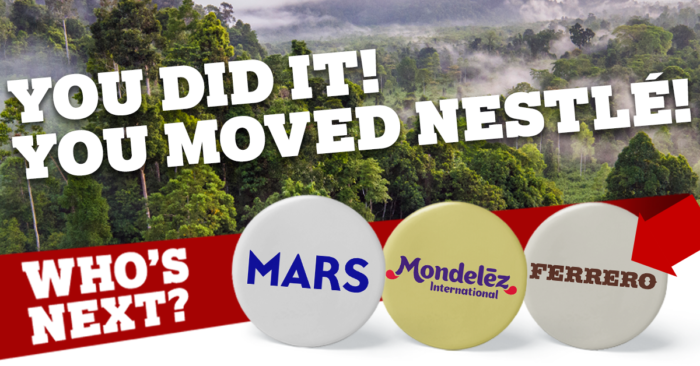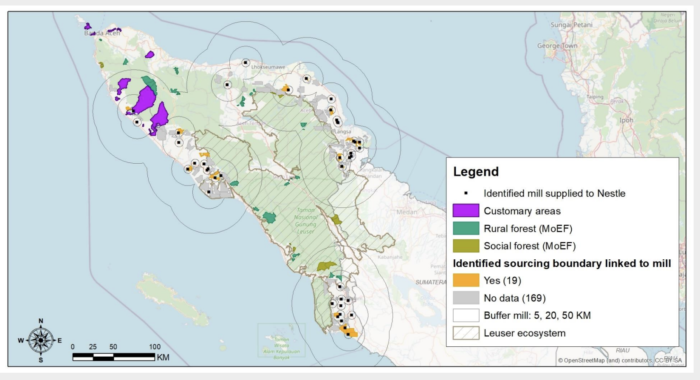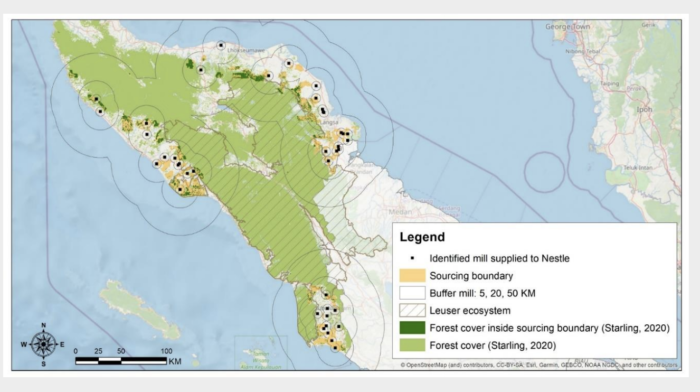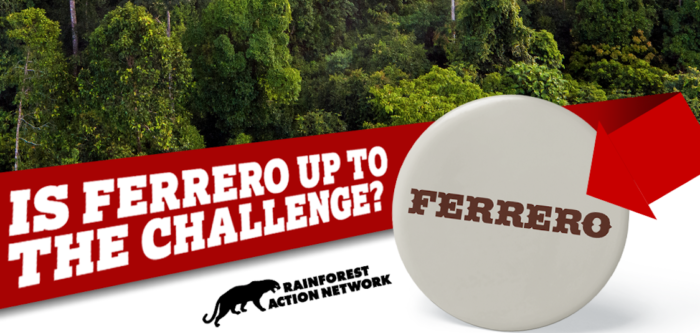Pressure builds on Ferrero, Mondelēz & Mars to follow suit
As 2020 drew to a close, Nestlé –– the world’s largest food and beverage company –– became the first major brand to begin to publicly disclose the “forest footprint” of its palm oil supply chain, beginning in Aceh – the Indonesian province where over 85% of the globally important Leuser Ecosystem is located. A forest footprint of an area is an accounting of the total area of forests, peatlands and the rights of Indigenous and local communities that have been, or could be, impacted by the brand’s consumption of forest-risk commodities like palm oil and paper.

Nestlé’s publication of its forest footprint in Aceh sets an important precedent and must be followed by its peers, including Ferrero, Mondelēz and Mars, whose supply chains and/or supplier operations remain tainted with Conflict Palm Oil produced at the expense of rainforests and the rights of Indigenous Peoples.
All of these companies and many more have made sweeping ‘No Deforestation’ commitments that were supposed to be realized by 2020. Now in 2021 it is clear that this commitment––made by Nestlé, Ferrero, Mondelēz and Mars and 400 of their peers in the Consumer Goods Forum–– is another broken promise. The truth remains that the world’s largest chocolate companies have failed to remove deforestation from their products. Until now, none of the chocolate giants have had a true and transparent accounting of the forests and communities affected by their use of forest-risk commodities so Rainforest Action Network and consumers are demanding action.
Nestlé has taken the first step to understand its impact in one of the most important forest regions on Earth –– the Leuser Ecosystem. Perhaps most importantly, Nestlé has recognized the importance of identifying customary lands and understanding the risks facing communities in its palm oil supply chain. It has also recognized the important role that communities play in safeguarding their forests and peatlands from further degradation or deforestation. As the stewards of the last rainforests, it’s never been more critical to secure land rights for Indigenous Peoples and local communities. Nestlé’s is calling this shift in its approach an evolution from a no-deforestation strategy to a ‘Forest Positive’ one.

Map showing identified customary areas in Aceh from Nestlé’s ‘Palm Oil Forest Footprint’ analysis.
Nestlé’s ‘Palm Oil Forest Footprint’ analysis has identified 89,667 hectares of forests and 8000 hectares of peatlands at risk of clearance, including inside palm oil concessions in the protected Leuser Ecosystem –– the last rainforest where Sumatran orangutans, elephants, rhinos and tigers still roam together in the wild. The Leuser Ecosystem also provides over 4 million local people with clean water and livelihoods, and it is globally important as a critical carbon sink. An additional 1.45 million hectares of forested land suitable for palm oil cultivation has been identified within 50km of mills in its supply chain across Aceh.

Map showing forests inside sourcing boundary’s from Nestlé’s ‘Palm Oil Forest Footprint’ analysis
Now, Nestlé must design and implement interventions that drive the protection of these forests and peatlands by palm oil companies and work alongside communities and governments to secure the legal recognition of communities’ rights across the region. Immediate steps must be taken to complete mapping of customary forest areas and to develop an understanding of community usage rights, land rights issues, and unresolved conflicts––conflicts that stem from failures to respect the rights of communities to oppose palm development on their lands. Nestlé must go beyond this pilot exercise and follow through with further assessments of its forest footprint across the globe.
RAN continues to call on Ferrero, Mondeléz and Mars–– three of the most influential corporations fueling the destruction of rainforests and the violation of human rights to know and disclose their forest footprints. Time is running out.
Mondeléz and Mars have long been exposed for their sourcing of palm oil from suppliers driving the destruction of the Leuser Ecosystem and their failure to end deforestation by known rogue actors in the region. Ferrero is the newest chocolate giant to be caught up in the scandal of chocolates driving the destruction of the Leuser Ecosystem.
In December 2020, Ferrero finally disclosed information on the suppliers of palm oil used to manufacture Ferrero products sold under the Thorntons, Fannie May and brands that were part of Nestlé’s confectionary business in the US. Most consumers are unaware that their favourite brands formerly owned by Nestlé–– including Butterfingers, Baby Ruth, and LaffyTaffy–– are now brands manufactured and owned by Ferrero. Ferrero took control of these brands through an acquisition of Nestlé’s US business and manufacturing facilities in Bloomington, Franklin Park and Itasca, Illinois. Since the acquisition, Ferrero has increased its exposure to sourcing Conflict Palm Oil imported into the US from Indonesia––including by controversial palm oil companies that have been exposed for sourcing from producers destroying rainforests in the Leuser Ecosystem.

Investigations published by RAN have shown mills known to supply Conflict Palm Oil in Ferrero’s supply chains––including those owned by PT. Syaukath Sejahtera, PT. Teupin Lada, PT. Beurata Subur Persada, PT. Samudera Sawit Nabati, Agro Astra Lestari, PT. Ensem Lestari, PT. Bangun Sempurna Lestari, PT. Runding Putra Persada, PT. Raja Marga, PT. Ensem Sawita, PT. Pati Sari and the PT. Perkebunan Nusantara (PTPN) group of companies. Another mill operated by PT. Nafasindo, that is certified by the Roundtable on Sustainable Palm Oil, has a sordid history of land conflict with local communities.
Given the failure of these mills to establish systems to achieve traceability to the plantation and be shown by credible independent verification mechanisms that they are not sourcing from producers clearing forests or continuing to violate human rights, Ferrero can simply no longer claim it is souring 100% responsibly produced palm oil. As a matter of urgency, Ferrero must investigate and disclose its forest footprint and strategies to address the negative impact that its supply chain has on forests, peatlands, and the rights of Indigenous People and local communities in the Leuser Ecosystem and across Indonesia.